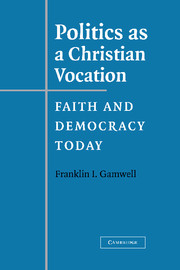Book contents
- Frontmatter
- Contents
- Preface
- Politics as a Christian Vocation
- Introduction: The Present Purpose
- 1 Render to Caesar
- 2 Government by the People
- 3 Faith and the Way of Reason
- 4 Justice in the Community of Love
- 5 Religious Decisions at Stake
- 6 Political Deliberations
- Appendix: On the Humanistic Commitment
- Works Cited
- Index
5 - Religious Decisions at Stake
Published online by Cambridge University Press: 18 February 2010
- Frontmatter
- Contents
- Preface
- Politics as a Christian Vocation
- Introduction: The Present Purpose
- 1 Render to Caesar
- 2 Government by the People
- 3 Faith and the Way of Reason
- 4 Justice in the Community of Love
- 5 Religious Decisions at Stake
- 6 Political Deliberations
- Appendix: On the Humanistic Commitment
- Works Cited
- Index
Summary
Christian faith prescribes, at least in our setting, a democratic political community. Our journey to this conclusion has been extended because full clarity about the prescription involves understandings of democracy and Christian faith that are, in some respects, contrary to widespread opinion. A democratic constitution defines politics as government through full and free discourse and, therefore, requires that religious convictions can be validated and invalidated by argument. The way of reason is also prescribed by Christian faith. It claims to represent the authenticity for which every human can decide and, thereby, affirms that its own abiding content can be assessed through reasons authorized by common human experience. Moreover, the substantive principles of Christian faith prescribe democracy because government by the people is essential to the community of love, to which God's call directs all human purposes. Thus, the life of Christian witness includes a common political vocation aimed at maximizing the access to general conditions of creativity that is equally available to all.
THE AIM AT JUSTICE
The importance of this vocation is worth underscoring. Human mutuality is the principal worldly source of the good life God wills for all, and the communal conditions of creativity stretch from our most personal and intimate relationships through neighborhoods, voluntary associations, and institutions of work and culture to the general character or structures of the political community as a whole.
- Type
- Chapter
- Information
- Politics as a Christian VocationFaith and Democracy Today, pp. 106 - 129Publisher: Cambridge University PressPrint publication year: 2004

